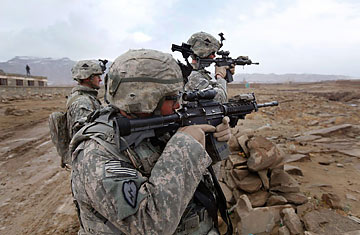
Jeremy Gleason, left, Sergeant Joseph Delair, center, and 2nd Lieutenant Josh Taylor watch movement at a distant mosque while on patrol with the Afghan National Police on Dec. 4, 2009, in Sar Hawza, Afghanistan
The week spent on Capitol Hill by Administration officials explaining President Obama's Afghan surge has produced much predictable politicking. Republicans tried in vain to coax General Stanley McChrystal into admitting their claim that Obama had denied him the resources he needs to win, and Democrats tried in vain to prod Kabul Ambassador Karl Eikenberry to reiterate his argument against a troop surge. Everyone stayed on message, but in explaining how the strategy might work, Generals McChrystal and David Petraeus made clear that U.S. military involvement in Afghanistan is not likely to end anytime soon or produce a "victory" in the sense that Americans have used the term since World War II.
Deadlines and Timetables
By declaring an intention to begin drawing down U.S. troops in July 2011 as
Afghan security forces begin to take charge, Obama's West Point speech was
criticized for giving the Taliban a reason to lie low and wait out the
Americans. It also, some argued, did little to discourage U.S. allies from
hedging their bets — Pakistan's continued coddling of the Afghan Taliban
and President Hamid Karzai's reliance on self-serving warlords.
But the congressional testimony of those who will implement Obama's strategy stressed that July 2011 is only an aspirational deadline. The decisions on the timing and scale of any troop withdrawal will be entirely conditions-based, McChrystal made clear, and he won't hesitate to ask for more troops if he thinks the situation demands it. (He didn't think it would, he assured legislators.) Still, the idea that any significant drawdown will be possible in 18 months requires a leap of optimism, given the state of play on the ground.
Indeed, if the key to withdrawing U.S. troops is the readiness of Afghan forces to take over, Karzai on Tuesday had some sobering news. With "maximum effort," he said in Kabul, his army would "hopefully" be in a position to provide security for the country five years from now. And, he hastened to add, simple economics dictated that an Afghan army big enough to take over from the Americans would have to be paid for by Washington for an additional 15 to 20 years.
Discussing deadlines right now was pointless, Petraeus suggested on Wednesday. A year from now, he said, Washington will have a better idea of whether the strategy is working. In the interim, the CENTCOM chief warned, things will get worse before they get better, and nobody should expect rapid progress. "Success will require steadfast commitment and incur significant costs," McChrystal said. "The sober fact is that there are no silver bullets."
What "Winning" in Afghanistan Means
All the senior figures in the Administration, when asked, insist they're in
Afghanistan to win. It was left to McChrystal to warn Congress not to expect a
1945-style unconditional surrender by the Taliban. In fact, the Taliban may
not even be defeated in the sense that Americans typically use the
term — McChrystal himself preferred words such as disrupt and degrade.
The general clearly recognizes that the Taliban are part of the fabric of
Afghan life and are unlikely to be eliminated. Victory, he said at one
point, "could be similar to politics, where you defeat the other party in an
election, but you don't wipe them out." At another point, he defined the goal
of the mission as "to prevent [the Taliban] from doing what they
want to do," i.e., sweeping back to power in Kabul.
Right now, as McChrystal has repeatedly made clear, the insurgents are actually winning. The urgency of sending reinforcements is to stop them from overrunning any population centers, to halt their momentum and ultimately to fight them to a standstill. That would give space for the development of Afghan governance and security forces, but it would also enhance prospects for some sort of political solution. Karzai has already reached out to the Taliban leadership through intermediaries in Saudi-brokered talks, which have gone nowhere. It's generally acknowledged by Western officials that the outcome in Afghanistan will require a political solution that integrates most of those currently fighting for the Taliban. Right now, however, the Taliban have no interest in seeking compromise because they believe they can regain control of Afghanistan on the battlefield. Only if they're fought to a standstill, goes the argument, and if Taliban commanders see more to gain and less to lose in some form of power sharing will they be prepared to settle for less than restoring what they lost when the U.S. invaded in 2001.
Even getting to that point is an uncertain bet and will involve much tough fighting. The Administration has always insisted that its goal is to prevent al-Qaeda from renewing its sanctuaries in Afghanistan, and it was notable that McChrystal emphasized the importance of capturing or killing Osama bin Laden in defeating al-Qaeda. By setting up bin Laden's elimination as a benchmark of success, McChrystal raises an intriguing possibility. The U.S. commander led the special-operations unit that eliminated Abu Mousab al-Zarqawi, leader of al-Qaeda in Iraq. If the war in Afghanistan is going to end on terms that are not an entirely comfortable fit with the American public's definition of victory, eliminating the leader of al-Qaeda could be used to make up the difference.
